Don't wanna be here? Send us removal request.
Text
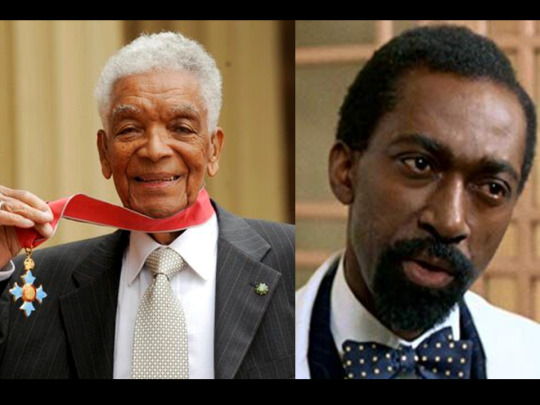
Remembering two pioneering black British actors, who passed away within days of each other in 2020.
Earl Cameron (left) was born in Bermuda in 1917. A merchant mariner, he began acting on stage during World War Two and made his film debut in 1951, in Pool of London, which was possibly the first British film to show a mixed-race romance. He created a significant body of work in television, and was reportedly the oldest surviving cast member of Doctor Who. He was awarded the CBE in 2009. The Guardian described Earl Cameron as Britain’s first black film star. In a 2017 interview, he said; “I never saw myself as a pioneer. It was only later, looking back, that it occurred to me that I was.” He passed away on July 3rd, 2020, aged 102. Louis Mahoney (right) enjoyed a long and varied career, appearing in movies Cry Freedom and Captain Phillips, and TV shows including Fawlty Towers, Yes Prime Minister and Doctor Who. He was born in 1938 in Gambia and initially trained as a doctor before turning to acting . He was one of the first black actors in the Royal Shakespeare Company in the 1960s and helped to establish Performers Against Racism in the 1980s, to campaign against apartheid in South Africa. He was a tireless campaigner for racial equality in his own profession, as a member of the Equity Afro-Asian Committee and as co-creator of the Black Theatre Workshop. London’s Royal Court Theatre remembered him as “a brilliant actor and the most wonderful human being; a devoted activist and extraordinary performer”. He passed away on June 28th, 2020, aged 81.
(Some background from BBC Reporting, The Guardian and IMDb)
#black britain#black theatre#social history#black british actors#black british history#social justice#activism#diversity and inclusion#society#race relations#british theatre#royal shakespeare company#british actors#doctor who#british cinema#royal court theatre#tv podcast
52 notes
·
View notes
Text

Pik-Sen Lim was born in Penang, Malaya, on September 15th, 1944. Of Chinese background, she came to the UK as a teenager in the early 60s and was soon working consistently on stage and television, including in 92 episodes of the pioneering medical drama, Emergency Ward 10.
Although continuing to build on an impressive body of work on screen and stage, she is perhaps mostly identified with the late 70s London Weekend sitcom, Mind Your Language, in which she played Su-Lee, the (ever so slightly) stereotypical Chinese communist student studying English. The series was a massive success in the UK and around the world, including in particular on the Sub-Continent.
Her husband was writer and producer Don Houghton (1930-1991), and her daughter is actor Sara Houghton.
(Image montage thanks to 70s Time Machine. Some background from IMDb and British Film Institute)
#british actors#asian actors#classic tv#british comedy#british cinema#british theatre#british television#british culture#mind your language#emergency ward 10#tv podcast
10 notes
·
View notes
Text
A reblog with a clarification:
Regarding a point made during the podcast about Joan Sims’ health and financial situation in her declining years, there are conflicting reports about whether or not Carry On producer Peter Rogers did, in fact, provide assistance. Some reports claim that Joan Sims’ request, either made personally or by her friend Liz Frazer depending on the source, was refused.
Although not referencing Joan Sims personally, in 2009 Julie Carpenter wrote in the Daily Express;
“…Further contradicting Rogers’s tight-fisted image is the fact that he could be charitable. He provided homes for redundant pit ponies, helped guide dogs for the blind (he loved his Alsatians) and continued to be sympathetic to old colleagues in need of help and advice. Leslie Phillips always said he was “very fond” of Rogers and called him an “amazing man”…”
In the case of Joan Sims, It would be nice to think he did the right thing.
This episode, we present part II of our conversation with leading UK author, publisher, podcaster and television historian, Oliver Crocker. In part one, we discussed his acclaimed book on the iconic BBC television series, All Creatures Great and Small. This time, we focus on his ongoing success, The Bill Podcast, according to Listen Notes in the top 1.5 % worldwide, and Oh, What a Lovely Memoir, the autobiography of actor Larry Dann, edited by Oliver and published by Devonfire Books.
Born in 1941, Larry Dann worked as a child actor in movies, which included a brush with Spencer Tracy, Deborah Kerr and George Cukor, was part of Joan Littlewood’s theatre workshop, worked with David Niven, and appeared in several Carry On movies, but became a household name on television as Sgt Alec Peters in one of the most popular and influential police shows of all, The Bill.

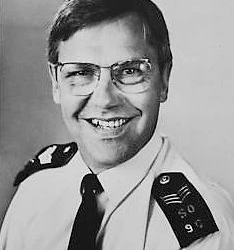
One of many highlights in Larry Dann’s memoir is the fascinating window he affords us into the groundbreaking Theatre Workshop, run by Joan Littlewood, and the production of their huge international hit, Oh What a Lovely War which, according to Michael Billington in The Guardian, not only changed attitudes toward the Great War, it also ‘remade British theatre’.
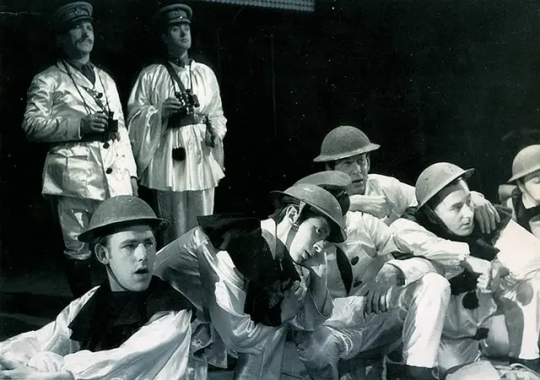
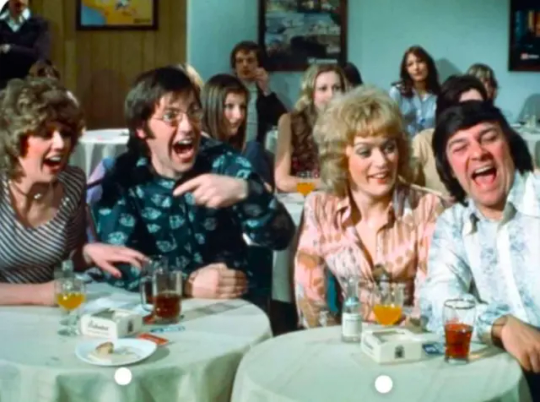
Top Image: Onstage in Oh What a Lovely War. Bottom Image: Larry Dann in Carry on Behind (1975) - with Carol Hawkins, Sherrie Hewson and Brian Osborne.
We talk a little more about the Carry Ons, and a fascinating series currently running for Oliver’s podcast subscribers, The Evidence Room, where Oliver takes us deep behind the scenes of of The Bill, thanks to an extensive archive of never before seen production documents and correspondence, provided exclusively by The Bill’s long serving production scheduler, Nigel Wilson.

The Bill ran for nearly 2500 episodes, from the pilot, Woodentop, in 1983, to its final episode in 2010.
Some more background, images, links and suggested further reference at our website;
Brian Murphy, a member of the Theatre Workshop with Larry Dann and who wrote the foreword to Oh, What a Lovely Memoir, sadly passed away since we recorded.
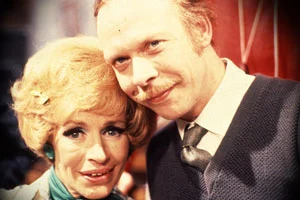
Special thanks to Oliver Crocker and to all our readers and listeners.
#classic television#british cinema#british theatre#the bill#the bill fans#the bill podcast#larry dann#british culture#podcast#carry on movies#joan sims
26 notes
·
View notes
Text
This episode, we present part II of our conversation with leading UK author, publisher, podcaster and television historian, Oliver Crocker. In part one, we discussed his acclaimed book on the iconic BBC television series, All Creatures Great and Small. This time, we focus on his ongoing success, The Bill Podcast, according to Listen Notes in the top 1.5 % worldwide, and Oh, What a Lovely Memoir, the autobiography of actor Larry Dann, edited by Oliver and published by Devonfire Books.
Born in 1941, Larry Dann worked as a child actor in movies, which included a brush with Spencer Tracy, Deborah Kerr and George Cukor, was part of Joan Littlewood’s theatre workshop, worked with David Niven, and appeared in several Carry On movies, but became a household name on television as Sgt Alec Peters in one of the most popular and influential police shows of all, The Bill.


One of many highlights in Larry Dann’s memoir is the fascinating window he affords us into the groundbreaking Theatre Workshop, run by Joan Littlewood, and the production of their huge international hit, Oh What a Lovely War which, according to Michael Billington in The Guardian, not only changed attitudes toward the Great War, it also ‘remade British theatre’.


Top Image: Onstage in Oh What a Lovely War. Bottom Image: Larry Dann in Carry on Behind (1975) - with Carol Hawkins, Sherrie Hewson and Brian Osborne.
We talk a little more about the Carry Ons, and a fascinating series currently running for Oliver’s podcast subscribers, The Evidence Room, where Oliver takes us deep behind the scenes of of The Bill, thanks to an extensive archive of never before seen production documents and correspondence, provided exclusively by The Bill’s long serving production scheduler, Nigel Wilson.

The Bill ran for nearly 2500 episodes, from the pilot, Woodentop, in 1983, to its final episode in 2010.
Some more background, images, links and suggested further reference at our website;
Brian Murphy, a member of the Theatre Workshop with Larry Dann and who wrote the foreword to Oh, What a Lovely Memoir, sadly passed away since we recorded.

Special thanks to Oliver Crocker and to all our readers and listeners.
#classic television#british cinema#british theatre#the bill#the bill fans#the bill podcast#larry dann#british culture#podcast#SoundCloud
26 notes
·
View notes
Text
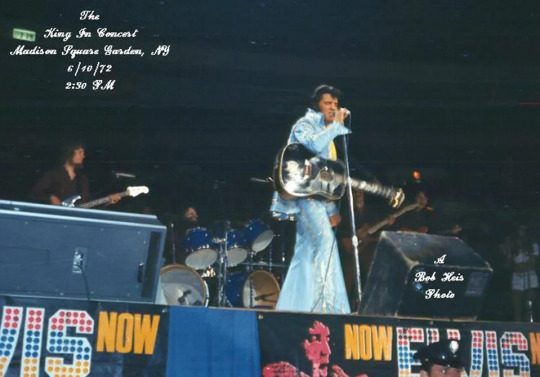
Bob Heis (1942-2012) was a military veteran, Elvis fan club administrator and part-time professional photographer who captured many great closeups of Elvis on stage in the 1970s, from around 40 concerts, including Madison Square Garden (above), Pittsburgh PA (New Year 76-77), and Elvis' final show in Indianapolis.

Bob Heis and Charlie Hodge (Credited to the Heis family at dignitymemorial.com)
He is immortalised on the 1972 As Recorded at Madison Square Garden album. Having sent a note backstage requesting Polk Salad Annie (which was probably on the setlist anyway), Elvis acknowledges him, "Okay, Bob!" at the beginning of the song.
#elvis fans#elvis history#elvis in the 70s#elvis presley#rock history#elvis 1970s#rock photography#stage photography#elvis presley history#podcast
27 notes
·
View notes
Text
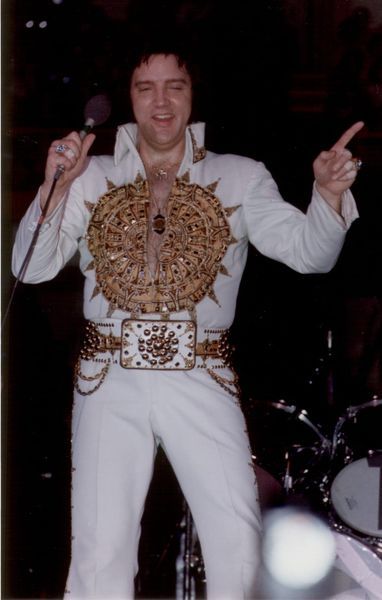
On May 29th, 1977, Elvis played the Baltimore Civic Center to an audience of just under 13 000. Like many shows from around this period, the truth has been somewhat obscured by slanted press reviews which have been uncritically rehashed in subsequent biographies. This show has earned some notoriety owing to Elvis leaving the stage for possibly as long as 30 minutes mid-show, leaving poor Charlie Hodge to lead the band through a series of introductions and solos in the face of increasing audience impatience.
Accounts vary as to what followed. One report suggested Elvis returned to the stage and completed the show in a 'desultory fashion', while another reported that 'he came back on like gangbusters'.
Interestingly, the unscheduled intermission didn't even rate a mention in the Baltimore Sun review, which offered the headline 'Presley Has the Old Magic Still', and described the show as 'intelligent and well-paced'.
"...Of course, by this time Elvis is virtually impervious to all criticism. The media have to buy tickets if they want to review him or take his picture, he doesn't need them (The Sun's photographer, who didn't have a ticket, was not allowed in the Civic Center.) He doesn't even have to sing. People come just to see him as they would visit a national monument...To the thousands who cheered him last night, he is a symbol of innocence tinged with just the right combination of sex, show business and country music. They don't know why exactly, but they still love him..."
The performance was preserved in an audience-recorded bootleg, and seems to be a generally solid show. Elvis tried his best to make amends following his absence, taking requests and making a big effort. Had he given the audience an extra 15 or 20 minutes beyond his usual stage time, he might just have got away with it.
(Review transcript thanks to Francesc Lopez at elvisconcerts.com)
#elvis history#elvis presley#elvis in the 70s#rock history#elvis fans#elvis 1970s#elvis#musicians#live music#elvis aaron presley#elvis presley history#podcast#music podcast#dec4 podcast
75 notes
·
View notes
Text



Denis Sanders, director of the cinema documentary Elvis That's The Way It Is (MGM 1970), set out to capture the Elvis Las Vegas experience from a number of different perspectives, one of which was a selection of fan interviews.
Virtually none of the contributors were identified, other than by little snippets of information they let slip during their interview sessions.
Sue Wiegert (pictured in the bottom right image with Tinkerbell the cat and Cricket Coulter), was the president of the Blue Hawaiians for Elvis Fan Club, and was interviewed together with Cricket, a friend of Elvis for 11 years, and who had actually worked for him for a while, although this genuine connection was not mentioned in the film. Tinkerbell (the cat) was described as a fan of Elvis' Vegas album, because 'it has a lot of action in it'.
One of the nicer interviews was with the mother and daughter (centre right) who were sharing the Elvis Las Vegas experience, demonstrating that Elvis' unique fan base transcended generations. "Mother doesn't like it when he stands too still, she likes a lot of action and I must admit I do too," the daughter explained. "He sends my phi beta kappa key jangling!"
The contributor in the blue cardigan is interesting. We never find out who he is, or anything about him. He's well spoken, and makes an articulate and useful contribution, yet the Village Voice, in their review of the movie, described him as 'possibly the creepiest young man ever to appear on screen'.
One of Colonel Parker's objections to the rough cut of the film, which he communicated directly to the MGM corporate head James (the Smiling Cobra) Aubrey, bypassing the director and producer, was that the fan interviews tended to distract from the excitement of the performance segments.
One segment that never made it to the final edit was an interview with some members of the cast of Hair, who apparently offered their responses by means of a slightly weird session of improvised acting...
It's interesting to compare the way Sanders treated the fan interviews in comparison to Bob Abel and Pierre Adidge for Elvis on Tour, two years later. In Elvis on Tour, there seemed to be a spirit of togetherness, in that the filmmakers put themselves, and the camera, right in the midst of the fans and on the same level; equally caught up in the excitement at the hotels, the airports, and the arenas. Denis Sanders, on the other hand, seemed to be examining them like museum exhibits, and perhaps quietly saying, Can you believe these people?
Colonel Parker was very complimentary about Denis Sanders' professionalism and commitment, despite their creative differences. Elvis biographer Peter Guralnick suggested that Denis Sanders might have had 'an implicit contempt for his subject'. A bit harsh maybe....
#elvis history#elvis presley#elvis in the 70s#rock history#elvis fans#elvis 1970s#mgm#elvis#classic hollywood#elvis movies#elvis on tour#elvis presley history#film edit
37 notes
·
View notes
Text
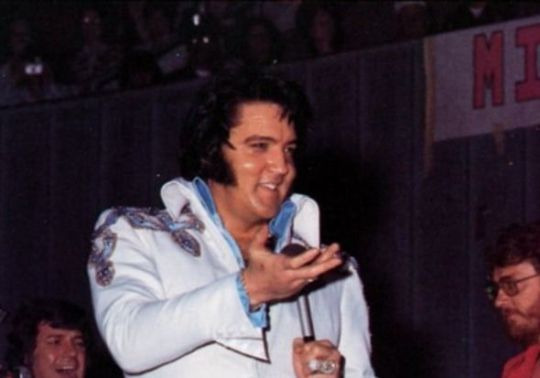
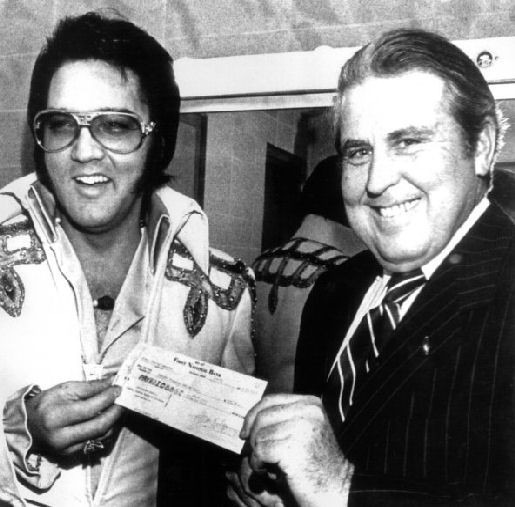
In May 1975, Elvis performed a special concert in Jackson, Mississippi; a benefit for the victims of a tornado that had recently devastated McComb, a town around 80 miles south of the State Capital.
It was the initiative of Colonel Parker, and although the altruistic intent could not be denied, he had an ulterior motive, cleverly using the initiative of the tornado benefit concert to coax an otherwise reluctant Elvis back to work. Following late night discussions at Graceland involving Colonel Parker himself, RCA executive George Parkhill, and concert promoter Tom Hulett, direct contact was made with Mississippi Governor, Bill Waller, and plans for the show were set in motion.
This is how Tom Hulett remembered the meeting at Graceland, as related in Peter Guralnick’s definitive biography, Careless Love: The Unmaking of Elvis Presley (Little, Brown and Company, 1999);
“…I had never been this much on the inside before, and here I was all of a sudden part of a unit going to see Elvis about possibly going back to work. Elvis came downstairs in a robe looking very heavy, and we sat at the big table in the dining room in tall, high-backed chairs. There was some small talk, and then the Colonel said, ‘Elvis, you been reading about the problems down in McComb?’ And he said, ‘Yeah, it’s really terrible.’ The Colonel said, ‘You know, I think we should go down and do a benefit for those people. What do you think?’ And Elvis goes, ‘You know, I don’t know…’ Because there was this funny shit going on between them, like Elvis is saying, ‘I ain’t gonna work,’ and the Colonel is saying, ‘I ain’t gonna let you work’—and now the Colonel has finally found an outside vehicle to break the ice…Finally, Elvis said, ‘Well, I guess,’ and the Colonel said, ‘If we go down and do the benefit, we might as well add on a few dates.’ That’s when I got the connection. And Elvis goes, ‘Well, I guess so…”
The benefit concert was eventually held on May 5th 1975, towards the end of what had expanded into an 18 show southern tour, between April 24th and May 7th.
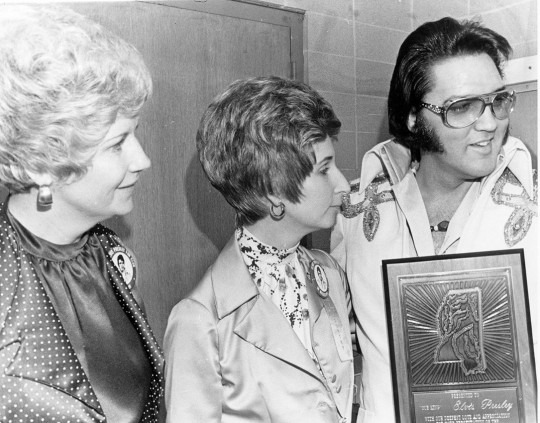
Elvis and Colonel Parker covered all their own costs, and everyone from onstage talent to road crew donated their time for the show. The State Fair Coliseum and staff were also provided at no cost. As a result of this cooperation at all levels, Elvis was able to hand a cheque for $108 860, from arena ticket sales alone, to the State Governor, prior to the show. The amount would go even higher from the sale of donated Elvis merchandise. The First Lady of Mississippi, Ava Waller, described Elvis' demeanour backstage as ‘very friendly’ and ‘surprisingly shy’.
The Delta Democrat Times wrote;
“…Elvis Presley returned to his native state for a benefit performance Monday night and received a thunderous reception from more than 10,000 fans who packed the Mississippi (State Fair) Coliseum. The 40 year old Tupelo native, a little heavier now but dazzling in a baby blue casual suit and dark blue shirt, strode onto the stage amid cheers and screams…”

A resolution of appreciation was passed in the Mississippi State Legislature, stating; “This compassionate gesture of concern is appreciated by all Mississippians”.
In order to secure the State Fair Coliseum at no cost, a deal was done that Elvis would return there for some paying dates. He performed three sold out shows over June 8th and 9th. There are apparently no surviving bootlegs of the benefit show, but the June 9th performance was recorded at the soundboard.
youtube

#elvis on stage#elvis presley#elvis history#elvis in the 70s#elvis 1970s#rock history#philanthropy#mississippi#70s elvis#elvis presley history#music podcast
69 notes
·
View notes
Text
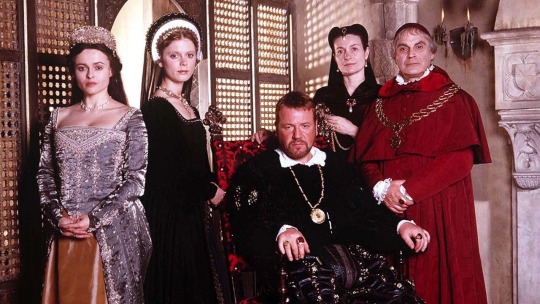
One of the more interesting casting choices for Henry VIII (aside from Sid James), would have to be Ray Winstone for a 2003 Granada/WGBH mini-series. Winstone made the conscious decision to speak in his natural voice, and played Henry as a boisterous East-London crime-boss with a hint of fading mid-70s Elvis charisma.
He had some very strong support in terms of additional casting; Helena Bonham Carter as Anne Boleyn, David Suchet as Cardinal Wolsey, Mark Strong as the Duke of Norfolk, Assumpta Serna (Sharpe) as Katherine of Aragon, Emilia Fox as Jane Seymour, Emily Blunt as Catherine Howard, and Sean Bean as Robert Aske.
There were a few classic quotes and moments; Norfolk is not confident in portrait artist Hans Holbein’s ability to capture Anne of Cleves ('You know these artistic types, unreliable!'). During negotiations following the Pilgrimage of Grace, King Henry calls Robert Aske 'a cheeky sod', and when Thomas Cromwell (Danny Webb) turns up for his execution, the young, nervous axeman assures Cromwell that he had been practicing all night, then buries the axe twice in Cromwell’s back (complete with sound effects and audience reaction) before finally managing slice off his head, to a big cheer from the crowd.
It was originally to be written by Alan Bleasdale (Boys from the Blackstuff) but it appears that creative differences with the producers and early funding uncertainties led to him being replaced by Peter Morgan.
The series won an International Emmy for most outstanding television movie or mini-series.
#henry viii#ray winstone#sean bean#sharpe#tudor dynasty#anne boleyn#david suchet#british television#historical drama#british drama#period drama#uk history#british culture#tv podcast
96 notes
·
View notes
Text
Great clear and close up footage of Elvis. Monroe, Louisiana. May 3, 1975. Evening show. ( silent footage )
#elvis fans#elvis history#elvis music#elvis in the 70s#elvis presley#elvis presley history#70s elvis#music podcast#podcast
36 notes
·
View notes
Text
youtube
Following on from a two-week Las Vegas engagement in March, Elvis kicked off his first arena tour in six months at Macon (GA) Coliseum, on April 24th, 1975. Part of the show was recorded at the soundboard and bootlegged.
There was huge local excitement about Elvis coming to town. One local paper reported that Elvis' entourage included twenty bodyguards, and they had booked out the entire top floor of the local Hilton, the transport arrangements having included a large private jet, blue and yellow Cadillac limousines and a chartered greyhound coach. Hotel staff told the paper that Elvis nearly took a tumble on a slippery floor while accessing the hotel through the kitchen, but took it in good humour.
The Macon Telegraph reported;
"…Elvis Presley, who has been selling out auditoriums and arenas for 20 years, did it again in Macon Thursday night before a crowd of 10,242 persons, who travelled from all over the Southeast to hear the legendary performer sing…At 9.40 p.m, Presley walked up the eight steps leading to the five foot high, 32 by 40 foot stage and the overflow crowd burst into yells, tears, screams and roaring applause…The performer immediately began singing See See Rider, which was followed by I Got A Woman. He paused after these two numbers and introduced himself to the elated crowd as Johnny Cash. That drew a tremendous round of laughter and applause…Presley, wearing a blue suit with silver sequins, followed those songs with 15 others, including such favourites as Love Me, Burning Love and Let Me Be There…Presley left the stage amidst thundering applause and thrilled fans who stretched over the balcony trying to touch the performer…"
It’s an interesting set-list, with the emphasis on more contemporary material. This mix is a little different with piano dominating in the rock numbers, and actually overpowering the vocal in some parts.
The tour extended through to May 7th, and included a benefit show in Jackson for victims of a recent Tornado in McComb, MS.
#elvis history#elvis in the 70s#elvis concerts#elvis presley#elvis live#bootleg#live music#elvis presley history#podcast#music podcast
16 notes
·
View notes
Text
youtube
On April 25th, 1977, Elvis played the first of two non-consecutive shows to just over 7 000 at the Saginaw Civic Center (Wendler Arena). Demand for tickets at the smallish venue resulted in a second show being added to the end of the tour, on May 3rd. The show was captured in an audience recording.
The Saginaw News was there for both nights, the first review credited to Anthony A Rocha and Janet Martineau;
"…Elvis, despite being in his 40s and carrying extra pounds, still turns 'em on. He still has that animal magic, that power that with a single swivel or smirk or glare can elicit screams…He looks tired and a bit the worse for wear. He doesn't gyrate nearly as much as he used to. His singing time amounts to less than an hour of the two and one half hour concert. But despite that, he sings as well as ever. His sense of humor sparkles. In fact, he seemed in rare form Monday - he didn't forget any words to any songs as he has in the past… and he seemed to be having as good a time as his fans…"
The review noted the prominent hard-sell of merchandise, and expressed some relief that Elvis hadn’t torn his pants, implying that this was otherwise a nightly occurrence, but did concede that Elvis was ‘not the hulking mass many writers would have us believe he is’.
Anthony Rocha had sole credit for the second review, and had obviously given the Elvis phenomenon some thought in the days between shows.
"…. Elvis Presley is a successful practitioner of maintaining his total appeal despite the passing years and excess weight…The gathering of young and not so young in sharing the Presley experience appeared to prefer the form rather than the substance…For most of the people who saw Presley during his appearances, the memory and experience of the show made the effort to attend worth it. The larger question for Presley and his management is whether sacrificing his self-imposed solitary existence can continue in the push for profits. Presley's contact with the real world by a visit to the small markets might prove to him that maintaining his legend is not worth the price of loneliness he has paid over the years…"
The reference to playing the smaller markets perhaps has some merit, but it’s worth noting that during this period Elvis played Chicago Stadium three times (20 000 seats), Largo Capital Center, Maryland (19 000), Kemper Arena, Kansas City (17 000), Philadelphia Spectrum (18 800), Market Square Arena, Indianapolis, (18 000) and numerous other venues seating between 10 000 and 17 000, almost all of which were sold out or near enough.
Peter Guralnick, in his definitive biography, Careless Love: The Unmaking of Elvis Presley, was quite harsh about this period (perhaps unfairly in places), but did concede that there were some shows that reminded everyone of how it was, and perhaps could be again. This was very probably one of those nights.
#elvis music#elvis on stage#elvis fans#elvis history#elvis presley history#elvis presley#live music#classic rock#elvis#podcast#music podcast
14 notes
·
View notes
Text
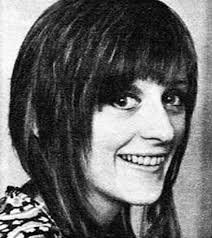

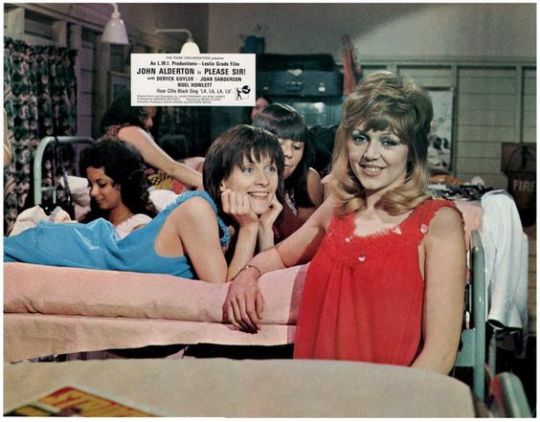
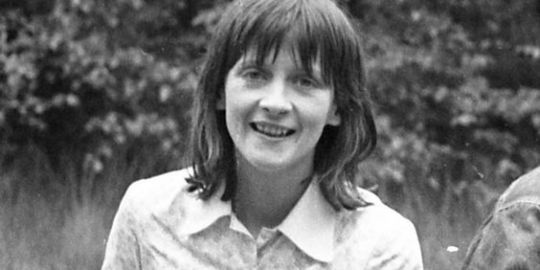
Remembering Liz Gebhardt, born April 12th, 1945, who found lifelong fame as Maureen in the LWT sitcoms Please Sir and Fenn Street Gang, as well as the successful movie adaptation of Please Sir.
She was active in British television from 1966 to 1994, with roles in The Naked Civil Servant, The Bill, with Rodney Bewes in Dear Mother Love Albert (not an altogether happy experience, according to David Barry's memoir, Please Sir: The Official History), Grange Hill, and a memorable cameo in Keeping Up Appearances. Her final credited television appearance was in 1994, in Love Hurts.
She passed away in 1996, aged 51, reportedly from injuries sustained during radiotherapy treatment for breast cancer. She was married to actor and theatre director, Ian Talbot.
#Liz Gebhardt#please sir#british actors#british comedy#british culture#london weekend television#british cinema#fenn street gang#british theatre#social history#the naked civil servant#podcast#tv blog
16 notes
·
View notes
Text
This episode, we��re enormously privileged to welcome award winning filmmaker and author, David Leaf, to discuss his latest book, SMiLE: The Rise, Fall & Resurrection of Brian Wilson. This celebratory work takes us to the very heart of Brian Wilson’s lost musical masterpiece; its traumatic unravelling in 1967, and the road to a triumphant rebirth in 2004 as an ecstatically received live concert experience and studio album.
David affords us some fascinating, behind the scenes insights into his 2001 television special recorded at Radio City Music Hall, An All-Star Tribute to Brian Wilson, his Grammy-nominated documentary, Beautiful Dreamer: Brian Wilson and the Story of SMiLE, and talks candidly about some of the life experiences that shaped Brian’s exquisite artistry.

Brian Wilson and David Leaf in 2022
Brian Wilson’s epic journey through the music of SMiLE is a dramatic and inspirational story, and we’re so lucky to learn about it from someone with such a uniquely close and personal perspective, who was critical to bringing SMiLE back to life, and to whom Brian Wilson himself said, ‘I can’t do this unless you’re there with me every day’.


More background, including some links to suggested further reading, viewing and listening, at our website;
Very special thanks to David Leaf, and to our leading contributor Gary Wells.
#music podcast#brian wilson#david leaf#smile#brian wilson presents smile#the beach boys#rock music history#SoundCloud
58 notes
·
View notes
Text

In March, 1976, two highly accomplished Nashville musicians joined the Elvis show for the first tour of the year; Larrie Londin on drums and Shane Keister on piano.
Larrie Londin recalled that they all assembled at Graceland prior to the tour for band rehearsals - Elvis dropped in to say hello and then left. Larrie thought he had gone off to get a soft drink, but it soon became apparent that Elvis wasn't coming back. All their gear was then packed up and shipped to the first venue, and he and Shane Keister had to make it up as best they could on stage.
Larrie Londin said this of Elvis' special rapport with his drummers;
"…Elvis hated drum risers. He wanted the drums on the floor right next to him, as close as possible. He wanted to feel the bass drum kicking him in the ass. He roamed around the stage, but at critical moments in the show - tempo changes and endings - he was always right there close - so that I could see him give signals…"
youtube
#elvis history#elvis presley#elvis in the 70s#rock history#elvis fans#elvis#elvis 1970s#live music#musicians#drummers#larrie londin#shane keister#rock and roll piano#1970s rock#podcast
42 notes
·
View notes
Text

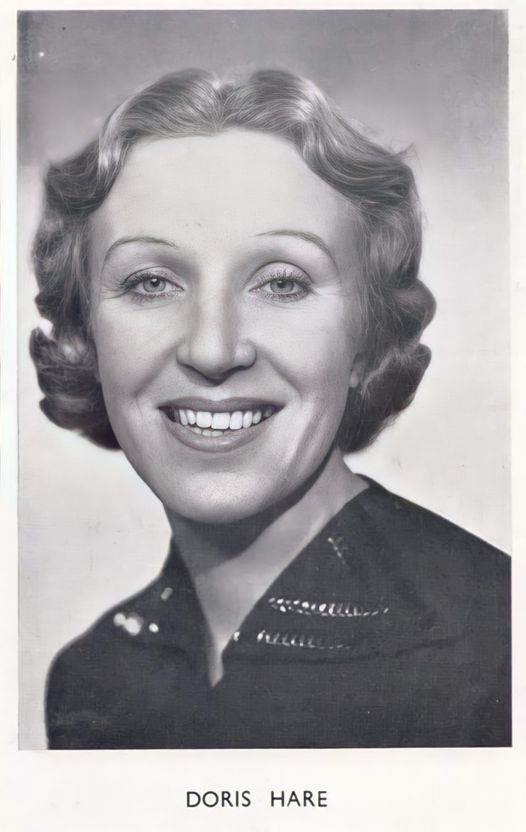
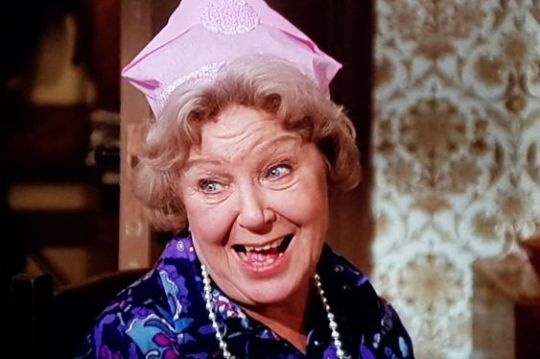

Remembering Welsh entertainer Doris Hare MBE, born March 1st, 1905.
She was born into a travelling theatrical family and made her stage debut in a speaking role aged three, then worked for decades in music hall, variety and musical theatre, and in the 1960s for the Royal Shakespeare Company and National Theatre.
During World War Two she hosted a radio programme especially for merchant mariners, Shipmates Ashore, and became 'the Sweetheart of the Merchant Navy', for which she was awarded the MBE.
She found later fame as 'Mum' in On the Buses, on television and in the cinema adaptations (1969-73), and in three 'Confessions' sex comedies, which were some of the most profitable British films of the 1970s.

Her film career spanned 60 years, from Night Mail in 1935 to her final credit, Second Best, directed by Chris Menges and starring William Hurt and Keith Allen, in 1994.
According to a tribute in the Borehamwood and Elstree Times:
"...At the grand age of 87, Doris Hare was to take to the West End stage one last time. Doris appeared at the Playhouse Theatre in the Ray Cooney farce, It Runs in the Family. The role saw her reunited opposite former Benny Hill straight man, Henry McGee..."
She passed away at Denville Hall, the residential care home for artistes, on May 30th, 2000.
#social history#british culture#british theatre#british television#music hall#british comedy#musical theatre#variety#british cinema#doris hare#merchant navy#on the buses#shipmates ashore#confessions#podcast
12 notes
·
View notes
Text



Elvis played the Houston Livestock Show and Rodeo in 1970 and 1974.
There were a number of challenges - the small stage was in the centre of the Houston Astrodome floor with the audience a long way away. In early 1970 Elvis had no touring operation as such, his crew therefore had no concept of stadium sound. (They would later use pioneering arena sound designers Clair Brothers).
The first show of six in 1970, a matinee, was attended by a sparse 16 700 people, 4 000 of which were children with disabilities who had been given complimentary tickets as guests of Elvis and Colonel Parker. The audiences for this engagement grew to a peak of 43 614, a world record for an indoor rodeo event.
The small stage, which was towed into the arena like a trailer, meant was no room for the orchestra or even a pared back horn section so, by 1974, the show had an unusually raw rock and roll sound in the context of the time.
In 1974, Elvis broke his own record at the rodeo, with an audience of over 44 000 for the second of two performances.
#elvis concerts#elvis history#elvis aaron presley#houston#houston astrodome#houston rodeo#elvis fans#elvis presley#elvis in the 70s#elvis music#elvis presley history#clair brothers#podcast
41 notes
·
View notes